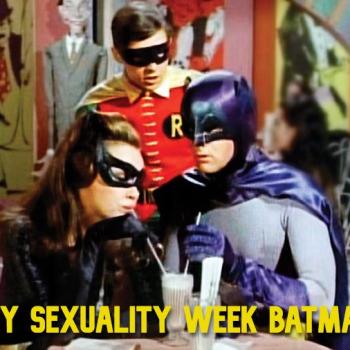I tripped over a very strange sentence in The New York Times on Friday. It was in John Leland’s article about the group of evangelical Christians planting churches in the East Village, the “Evangelical Squad” behind Trinity Grace Church.
Responding in the Village Voice, Rosie Gray has some fun with the way this group is “trying to seem so hip and edgy in an awkward ‘Cool Dad’ kind of way.” And she’s right, but that’s not what bugged me. What bugged me was this paragraph:
Sexual morality has been a divisive issue for some Christian churches, and a challenge for an evangelical church trying to move into the East Village. Trinity Grace considers all sex outside marriage sinful, and marriage as a union between a man and a woman. Mr. Wasko said that he had kissed three women before marrying his wife, and that he now regretted all of them.
This is just bewildering.
… He had kissed three women before marrying his wife, and that he now regretted all of them.
Alien. Incomprehensible.
… He now regretted all of them.
This is so very much the opposite of my own experience, memory and emotions that I started to worry that maybe I was the weirdo here. Maybe this enduring regret for every kiss one has ever shared, given or received is the normal human response. Maybe it’s just me who’s being strange for not being stricken by that regret.
But then I remembered, you know, every song and poem ever written on the subject. I don’t think it’s just me. Pastor Wasko’s burden of regret is odd.
It’s possible, of course, for a kiss to be something regrettable. Like any other interaction with another person, a kiss might be shared for the wrong reasons. A kiss might be duplicitous, or it could be a betrayal. It might even be a kind of exploitation — a taking advantage of someone else. But those would be extraordinary, unusual cases and one doesn’t get the sense that such extraordinary, unusual cases are what Mr. Wasko is describing. He’s not suggesting that he was extraordinarily unlucky to have gone 0-for-3. He is suggesting that this is how it should be for everyone, that every little kiss to anyone other than one’s eventual spouse — every first kiss other than one’s last first kiss — should and will be cause for regret and remorse.
And the more I thought about it, the more that made me angry. Wasko is presenting his alleged regret as normative and instructive for his congregation. He wants them, in a way requires them, to feel and express this same misplaced regret.
He is unhappy about something he has no cause to be unhappy about, so he wants his congregation to share his unhappiness. He is filled with remorse and shame for things for which he has no cause to feel remorse and shame, and now he is inflicting that remorse and shame on his congregation.
That’s wrong. It’s cruel — a kind of pastoral malpractice.
And what about those three unfortunate women who are the objects of Pastor Wasko’s ostentatiously inordinate regret? Is there any way for them to hear this without perceiving it as rude and unkind? Or, even worse, as suggesting there was something regrettably dirty about them? Doesn’t it seem to say that the kisses their younger selves shared with his younger self have somehow tainted him? Doesn’t it seem to say that these women were and are, somehow, unclean?
And for what? Because of a kiss.
And more importantly what of Mrs. Wasko? I would guess that her future husband was not the first and the only boy or man she ever kissed. And her husband seems to expect her to feel remorse and regret because of that. He expects her to feel sadness and shame for whatever may have transpired in her life before they met. One gets the sense that he would hold her to the same strange standard of “sexual morality” he is applying to himself — and that he would be no more able to come to terms with her past than he has been able to come to terms with his own. One gets the sense that he regards her supposed past supposed “transgressions” as being as regrettable as his own. His voluntary expression of regret for the three kisses in his own past suggest an unspoken, but tangible, resentment of any similar kisses in her past.
Take something normal and innocent and good and recast it as something impure and wicked and it seems to me you’re bound to end up in such a place — burdened with unshakable regrets and unspoken resentments.












